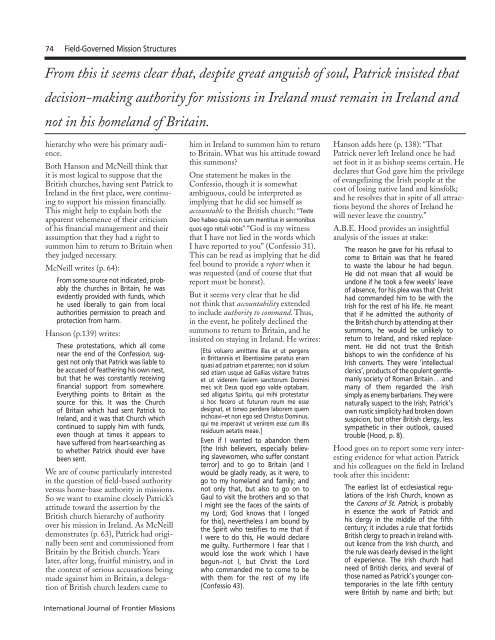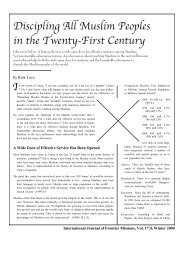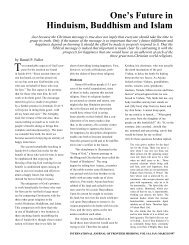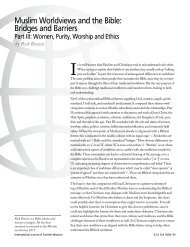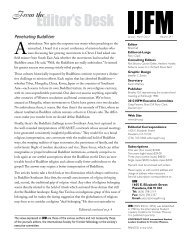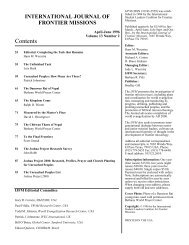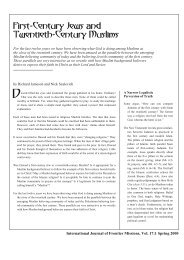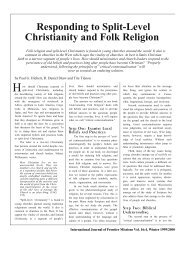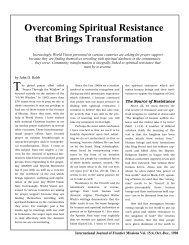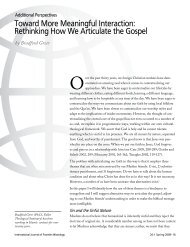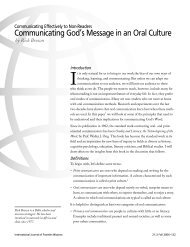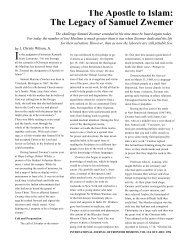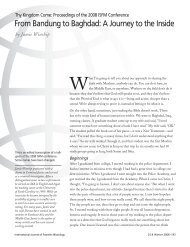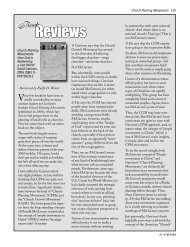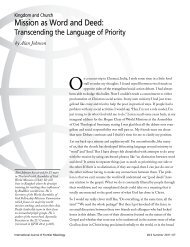Volume 18:2 - International Journal of Frontier Missions
Volume 18:2 - International Journal of Frontier Missions
Volume 18:2 - International Journal of Frontier Missions
You also want an ePaper? Increase the reach of your titles
YUMPU automatically turns print PDFs into web optimized ePapers that Google loves.
74 Field-Governed Mission Structures<br />
From this it seems clear that, despite great anguish <strong>of</strong> soul, Patrick insisted that<br />
decision-making authority for missions in Ireland must remain in Ireland and<br />
not in his homeland <strong>of</strong> Britain.<br />
hierarchy who were his primary audience.<br />
Both Hanson and McNeill think that<br />
it is most logical to suppose that the<br />
British churches, having sent Patrick to<br />
Ireland in the first place, were continuing<br />
to support his mission financially.<br />
This might help to explain both the<br />
apparent vehemence <strong>of</strong> their criticism<br />
<strong>of</strong> his financial management and their<br />
assumption that they had a right to<br />
summon him to return to Britain when<br />
they judged necessary.<br />
McNeill writes (p. 64):<br />
From some source not indicated, probably<br />
the churches in Britain, he was<br />
evidently provided with funds, which<br />
he used liberally to gain from local<br />
authorities permission to preach and<br />
protection from harm.<br />
Hanson (p.139) writes:<br />
These protestations, which all come<br />
near the end <strong>of</strong> the Confession, suggest<br />
not only that Patrick was liable to<br />
be accused <strong>of</strong> feathering his own nest,<br />
but that he was constantly receiving<br />
financial support from somewhere.<br />
Everything points to Britain as the<br />
source for this. It was the Church<br />
<strong>of</strong> Britain which had sent Patrick to<br />
Ireland, and it was that Church which<br />
continued to supply him with funds,<br />
even though at times it appears to<br />
have suffered from heart-searching as<br />
to whether Patrick should ever have<br />
been sent.<br />
We are <strong>of</strong> course particularly interested<br />
in the question <strong>of</strong> field-based authority<br />
versus home-base authority in missions.<br />
So we want to examine closely Patrick’s<br />
attitude toward the assertion by the<br />
British church hierarchy <strong>of</strong> authority<br />
over his mission in Ireland. As McNeill<br />
demonstrates (p. 63), Patrick had originally<br />
been sent and commissioned from<br />
Britain by the British church. Years<br />
later, after long, fruitful ministry, and in<br />
the context <strong>of</strong> serious accusations being<br />
made against him in Britain, a delegation<br />
<strong>of</strong> British church leaders came to<br />
<strong>International</strong> <strong>Journal</strong> <strong>of</strong> <strong>Frontier</strong> <strong>Missions</strong><br />
him in Ireland to summon him to return<br />
to Britain. What was his attitude toward<br />
this summons<br />
One statement he makes in the<br />
Confessio, though it is somewhat<br />
ambiguous, could be interpreted as<br />
implying that he did see himself as<br />
accountable to the British church: “Teste<br />
Deo habeo quia non sum mentitus in sermonibus<br />
quos ego retuli vobis” “God is my witness<br />
that I have not lied in the words which<br />
I have reported to you” (Confessio 31).<br />
This can be read as implying that he did<br />
feel bound to provide a report when it<br />
was requested (and <strong>of</strong> course that that<br />
report must be honest).<br />
But it seems very clear that he did<br />
not think that accountability extended<br />
to include authority to command. Thus,<br />
in the event, he politely declined the<br />
summons to return to Britain, and he<br />
insisted on staying in Ireland. He writes:<br />
[Etsi voluero amittere illas et ut pergens<br />
in Brittanniis et libentissime paratus eram<br />
quasi ad patriam et parentes; non id solum<br />
sed etiam usque ad Gallias visitare fratres<br />
et ut viderem faciem sanctorum Domini<br />
mei; scit Deus quod ego valde optabam,<br />
sed alligatus Spiritu, qui mihi protestatur<br />
si hoc fecero ut futurum reum me esse<br />
designat, et timeo perdere laborem quem<br />
inchoavi—et non ego sed Christus Dominus,<br />
qui me imperavit ut venirem esse cum illis<br />
residuum aetatis meae.]<br />
Even if I wanted to abandon them<br />
[the Irish believers, especially believing<br />
slavewomen, who suffer constant<br />
terror] and to go to Britain (and I<br />
would be gladly ready, as it were, to<br />
go to my homeland and family; and<br />
not only that, but also to go on to<br />
Gaul to visit the brothers and so that<br />
I might see the faces <strong>of</strong> the saints <strong>of</strong><br />
my Lord; God knows that I longed<br />
for this), nevertheless I am bound by<br />
the Spirit who testifies to me that if<br />
I were to do this, He would declare<br />
me guilty. Furthermore I fear that I<br />
would lose the work which I have<br />
begun—not I, but Christ the Lord<br />
who commanded me to come to be<br />
with them for the rest <strong>of</strong> my life<br />
(Confessio 43).<br />
Hanson adds here (p. 138): “That<br />
Patrick never left Ireland once he had<br />
set foot in it as bishop seems certain. He<br />
declares that God gave him the privilege<br />
<strong>of</strong> evangelizing the Irish people at the<br />
cost <strong>of</strong> losing native land and kinsfolk;<br />
and he resolves that in spite <strong>of</strong> all attractions<br />
beyond the shores <strong>of</strong> Ireland he<br />
will never leave the country.”<br />
A.B.E. Hood provides an insightful<br />
analysis <strong>of</strong> the issues at stake:<br />
The reason he gave for his refusal to<br />
come to Britain was that he feared<br />
to waste the labour he had begun.<br />
He did not mean that all would be<br />
undone if he took a few weeks’ leave<br />
<strong>of</strong> absence, for his plea was that Christ<br />
had commanded him to be with the<br />
Irish for the rest <strong>of</strong> his life. He meant<br />
that if he admitted the authority <strong>of</strong><br />
the British church by attending at their<br />
summons, he would be unlikely to<br />
return to Ireland, and risked replacement.<br />
He did not trust the British<br />
bishops to win the confidence <strong>of</strong> his<br />
Irish converts. They were ‘intellectual<br />
clerics’, products <strong>of</strong> the opulent gentlemanly<br />
society <strong>of</strong> Roman Britain . . . and<br />
many <strong>of</strong> them regarded the Irish<br />
simply as enemy barbarians. They were<br />
naturally suspect to the Irish; Patrick’s<br />
own rustic simplicity had broken down<br />
suspicion, but other British clergy, less<br />
sympathetic in their outlook, caused<br />
trouble (Hood, p. 8).<br />
Hood goes on to report some very interesting<br />
evidence for what action Patrick<br />
and his colleagues on the field in Ireland<br />
took after this incident:<br />
The earliest list <strong>of</strong> ecclesiastical regulations<br />
<strong>of</strong> the Irish Church, known as<br />
the Canons <strong>of</strong> St. Patrick, is probably<br />
in essence the work <strong>of</strong> Patrick and<br />
his clergy in the middle <strong>of</strong> the fifth<br />
century; it includes a rule that forbids<br />
British clergy to preach in Ireland without<br />
licence from the Irish church, and<br />
the rule was clearly devised in the light<br />
<strong>of</strong> experience. The Irish church had<br />
need <strong>of</strong> British clerics, and several <strong>of</strong><br />
those named as Patrick’s younger contemporaries<br />
in the late fifth century<br />
were British by name and birth; but


